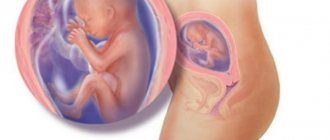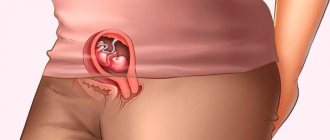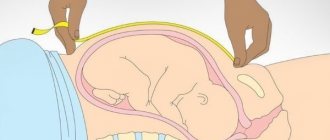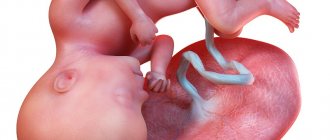Fetal development at 14 weeks of gestation
Fruit size:
12-14 cm.
Fruit weight:
30-50 g
The 14th obstetric week is the first week of the second trimester and the beginning of the 4th month of pregnancy, you are on day 98 of pregnancy, you are 34% along the way. The fourteenth week of pregnancy is a relatively calm time of bearing a baby. The difficult first trimester is already behind us and the pregnant woman’s condition has gradually returned to normal.
Much has become clear and understandable, the body has become accustomed to the new state, the woman’s thoughts have become harmonious, and the most positive, interesting and unique time lies ahead. You need to start communicating with the child, because he can already hear his mother’s voice, feel her mood and even taste what she eats.
What happens to the baby at 14 weeks of pregnancy?
The baby's height is already about 12-14 cm, and his weight is 30-50 grams. Its size is comparable to an average apple or lemon
The child’s organs are already developed and fully functioning, improving more and more every week. Also, the genitals have already formed, although it is still difficult to see the gender on an ultrasound. Therefore, we offer you reliable ways to find out the gender of your baby, which we discussed in this article.
When special tests are carried out at the 14th week, you can already find out the baby’s Rh factor (although the blood may not yet be completely formed).
The week described is considered the beginning of the second trimester of pregnancy, which is considered a turning point. During this period, the risks of pathology and abnormalities of the child are minimized. The child is actively growing and reminds himself more and more often. His height by this time is already nine centimeters, and his weight is within 35 grams. The baby is becoming more and more like a little man. She also leads an active life, clenches and unclenches her fists, and can frown and smile. Sometimes the baby touches the abdominal wall and immediately pushes away from it. Although mother often does not feel such tremors yet.
The bone tissue of the skeleton continues to actively grow and the first ribs appear. The child can also move the diaphragm; these movements are somewhat reminiscent of the breathing process. The baby is able to distinguish the taste of what the mother eats and drinks and even reacts to the taste. If the taste of the product is sour or bitter, then the swallowing reflexes are weak. If the baby feels something sweet, he begins to swallow the anatomical liquid more frequently. The baby's body is covered with a thick lubricant that protects it. Under the grease, thin skin with fluff is already visible. This fluff, which is also on the head, retains protective lubricant. In the future, lubricant will help the baby move towards the birth canal. During this period, the baby already has eyelashes and eyebrows.
The baby is already well established in the uterus, he leads an active life and makes various movements: hiccups and yawns, bends his arms and legs, turns his head, sucks his finger. Joints appear in the arms and legs, which gives greater coordination to movements. The baby will respond to a light touch with some kind of reaction. He can stroke the placenta and even taste it.
Pregnant weight control
At each visit, the gynecologist will monitor the woman’s weight. Sometimes even daily measurements are required. It is most convenient to choose a specific time for weighing - morning or evening. This will allow you to obtain more accurate values and determine the daily and weekly increase. Most women gain several kilograms by week 14 as the uterus grows and body volume increases.
In addition, progesterone promotes the accumulation of fluid in tissues. The weight gain during this period should be 2-3 kg. If a woman suffered from toxicosis at the beginning of pregnancy, then the increase may be less.
An approximate diagram of optimal weight gain throughout pregnancy:
| Trimester | I | II | III |
| Weight gain, g | 1500 | 5000 | 4000 |
If a woman notices that weight gain is irregular or uneven (for example, more than 500 g in one week or no gain at all in 10 days), it is necessary to inform the doctor about this. The gynecologist will help you choose a diet that suits the weight and needs of the fetus.
Feelings of the expectant mother at 14 weeks of pregnancy
Many changes occur in the body of the expectant mother. This directly affects her appearance. The tummy becomes rounded, pigment spots appear on the face, and its features blur. Against the background of an increase in the production of growth hormone, the nose and lips enlarge. Blush may appear on the cheeks and bridge of the nose. Expectant mothers may experience a variety of sensations: a feeling of heat may appear on the face, upper torso, or hands. Sometimes there may be redness in these areas of the skin and increased sweating.
This occurs due to changes in heat transfer. Progesterone affects the blood supply to the mucous membranes. This may be manifested by nasal congestion, runny nose without other signs of inflammation, and some lack of air. Bleeding gums are sometimes observed. This may also be provoked by the increased need of the fetus for vitamin C. Nausea may occur. This is not a sign of toxicosis. Under the influence of hormones, the tone of blood vessels decreases. This leads to a decrease in blood pressure in a woman.
Why do you feel sick at 14 weeks? This is a manifestation of changes in blood pressure, which is acceptable during pregnancy. Despite possible worries, pregnancy during this period brings a lot of positive emotions and is accompanied by good health most of the time. Be positive and enjoy your interesting position.
The uterus continues to increase in size at 14 weeks of pregnancy. It is not only a container for the growing fetus, but also a point for the transfer of useful substances to it and the evacuation of unnecessary ones. It is well supplied with blood and normally does not have increased tone. This ensures proper development of the fetus. The height of the uterine fundus is fixed at 12 cm. This indicator is considered optimal for a singleton pregnancy and a normal amount of amniotic fluid.
Necessary studies and analyzes
The first screening, during which a woman takes a triple test (hCG hormone and estriol, alpha-fetoprotein protein), occurs at 11-13 weeks. It allows you to get a complete picture of the child’s health status and the possibility of chromosomal abnormalities. By the 14th week, the doctor and the expectant mother herself already know about the main parameters of fetal development. If everything is normal, then at this time the woman will have to undergo standard procedures at an appointment with a gynecologist:
- measuring weight and blood pressure;
- measuring the height of the uterine fundus, abdominal volume;
- urine and blood tests;
- Listening to the baby's heartbeat using a stethoscope.
For special indications, some pregnant women are prescribed a blood test for hormones and developmental defects. If the first screening revealed the possibility of defects, the doctor orders additional examinations. For example, placentocentesis is the collection of amniotic fluid to clarify the diagnosis.
Normal and dangerous discharge during pregnancy 14
Discharge at the 14th week of pregnancy may accompany a woman.
The main thing is to understand how dangerous they can be. Unchanged light, uniform and moderate ones, which may have a slightly sour odor, can be considered absolutely safe. Discharge that has changed in smell, consistency or color should cause concern. The most common disease, characterized by the presence of flaky or cheesy white discharge with an unpleasant odor, is candidiasis. The cause is most often hormonal changes along with weakened local immunity. Of course, this disease is unlikely to harm the fetus, but it can serve as a favorable environment for the development of more serious infections, such as human papillomavirus infection or sexually transmitted infections. The appearance of spotting, which is not accompanied by pain and appears after sexual intercourse or a medical examination, indicates the presence of cervical erosion, which, most likely, was already detected during the examination, but still requires additional consultation with a doctor.
What is the belly like in the fourth month?
At the fourteenth week, an ultrasound is performed, with its help, the doctor determines the correct position of the fetus, the size and growth of the uterus, and also listens to the heart rate. Its deviation may indicate the development of a defect, which requires urgent action.
Unfortunately, no one is immune from the occurrence of a frozen pregnancy; it can be detected even before an ultrasound scan. The first signs are persistent pain, bleeding, and repeated signs of toxicosis. As soon as you start to feel something like this, contact a specialist. The expectant mother, in the third month of pregnancy, begins to change her gait, the weight of her body fluctuates, and therefore, she needs to change her high-heeled shoes to more comfortable ones. If there are no contraindications, sign up for special training for expectant mothers. This will not only strengthen the body, but also provide excellent health and mood.
Pain at 14 weeks of pregnancy
A pregnant woman often does not notice any discomfort at this stage of pregnancy. But there are still situations when pain at the 14th week of pregnancy of various etiologies can haunt you. Abdominal pain felt by a woman in this position at this stage is not a rare occurrence. After all, increasing in size, the uterus puts pressure on all internal organs, which only darkens the mood. And the abdominal ligaments gradually begin to stretch, causing discomfort.
At the 14th week of fetal development, a pregnant woman may experience pain in the abdominal area. As a rule, they are localized in the lower abdomen. Such pain may be a consequence of stretched ligaments that hold the uterus. But it happens that abdominal pain has a cramping, aching pain. Their appearance is always sudden. There is a process of development of uterine hypertonicity. Sometimes pain in the abdomen is accompanied by pain in the back and lower back. Bloody discharge sometimes appears in the vagina. If you experience such pain, you should urgently consult your doctor so as not to provoke a miscarriage.
Also, due to the constantly increasing load on the back, pain may appear. Most often they are weak and go away if you simply change your body position. Many pregnant women may experience quite severe and frequent headaches at this time, sometimes with intolerance to bright light and strong sounds.
What is amniocentesis
Amniocentesis is an invasive procedure that is performed according to strict indications, as it slightly increases the likelihood of pregnancy complications. Namely: leakage of amniotic fluid, retroplacental hematoma and miscarriage. Amniocentesis is performed from 16 to 18-19 obstetric weeks of pregnancy. The indications are as follows:
- woman's age - more than 35 years;
- facts of chromosomal abnormalities - in the family, in children in a couple, as well as in close relatives;
- suspicion of defects in the fetus - based on ultrasound results in the first trimester, as well as during a “double test”;
- some somatic diseases - in a pregnant woman, for example, heart defects, diabetes.
Indications for amniocentesis are determined by a geneticist, so the day before the pregnant woman undergoes a consultation, where individual risks are calculated and a thorough survey is conducted to determine predisposition to certain diseases. Amniocentesis does not require preliminary preparation and is carried out in three steps:
- treating the skin of the lower abdomen with an antiseptic.
- puncture of the layers of skin and the body of the uterus under ultrasound control with a special needle.
- amniotic fluid intake - in a volume of 10-15 ml.
Subsequently, the amniotic fluid is examined for fetal cells, and the chromosome set in them is determined. Amniocentesis makes it possible to detect Down syndrome and other diseases associated with changes in the number and quality of chromosomes in a child.
Amniocentesis is not performed in the following cases:
- there is inflammation in the vagina;
- there are signs of a threatened miscarriage;
- with multiple myomatous nodes;
- inflammation in a woman with or without fever (ARVI, pyelonephritis).
The result of amniocentesis becomes known after two to three weeks. If serious illnesses in the fetus are confirmed, a woman may be offered termination of pregnancy for medical reasons up to 22 obstetric weeks of pregnancy.
Tips and tricks at 14 weeks pregnant
To make this period of pregnancy easy and enjoyable, it is important to follow certain recommendations:
- Try to lead an active lifestyle. Sign up for pregnancy gymnastics, yoga, or start going to the pool. Contraindications to this may include increased uterine tone, bloody or other suspicious discharge at the 14th obstetric week of pregnancy, as well as chronic diseases.
- If papillomas or birthmarks begin to grow on your skin, notify your doctor. And if genital warts appear on the surface of the mucous membranes, they must be treated, and this primarily concerns formations affecting the genital organs.
- Be thoughtful when choosing clothes and shoes. All the photos at 14 weeks pregnant show quite noticeable baby bumps. Therefore, it is important to give preference to loose clothing made from natural hypoallergenic materials. Well, choosing the right shoes will allow you to avoid such troubles as back pain.
- A healthy diet is also very important for you now. And besides, a woman should completely give up bad habits, strong coffee and alcohol.
- A good mood and a positive attitude are the key to your well-being during a period such as the 14th obstetric week of pregnancy. Therefore, the expectant mother should protect herself from anything that might bother her or upset her.
Participation of the child's father
Men approach their upcoming fatherhood differently. Some are busy with work and are only casually interested in the health and condition of the expectant mother. Others get annoyed by “pregnant” whims. There are very caring, attentive fathers, and this is the best option. It’s worse when concern turns into a commanding tone and all kinds of prohibitions.
Even if the pregnancy was planned and long-awaited, the child's father may not be 100% prepared for everything that happens over the next many months. Harmony and mutual understanding in the family will certainly help future parents overcome possible stress and problems. If they noticeably worsen or deteriorate, a joint consultation with a psychologist would not hurt.
The 14th week of pregnancy in general is the beginning of the calmest period of pregnancy. The problems of the first trimester are left behind, the happiness of imminent motherhood is felt to the fullest.
← Week 13 Week 15 →
Nutrition at 14 weeks of pregnancy
At the fourteenth week of pregnancy, the expectant mother is recommended to consume milk, cheese, kefir, fermented baked milk and other products. They are a source of protein and calcium, which are necessary for the normal growth and development of the baby. A woman should also include in her diet sources of essential amino acids such as eggs, fish, lean meat and poultry.
During the second trimester of pregnancy, a woman needs to eat cereals - buckwheat, rice, oatmeal. They are sources of B vitamins. It is also recommended that the expectant mother include fresh vegetables, berries, fruits, and nuts in her diet to prevent constipation. The total daily caloric intake is calculated based on the height, body weight, and physical activity of the mother; on average, it should not exceed 2500-3000 kcal per day.
Enrich your food with fiber. This can be fruits, vegetables (especially beets), nuts, seeds, bran, rye bread (preferably not fresh). Prunes and dried apricots have a laxative effect. Fermented milk products will help improve intestinal microflora. It is better to cook from whole non-white cereals in water. And the porridge does not come from bags. Fatty salted fish can also help, but do not overdo it with salt, this increases the load on the kidneys and increases the risk of developing edema. Drink more liquid, but non-carbonated.
An exception may be sparkling water enriched with magnesium, it stimulates peristalsis. It is better to release the gas from the bottle, this will prevent heartburn and flatulence. Magnesium will help hair, nails, and skin, and normalize the nervous system. It is found in the same nuts, legumes, spinach. Drink freshly prepared fruit drink without sugar (it’s better to add honey), green tea and, if you have coffee, then natural coffee – freshly ground and freshly brewed. But do not forget about the load on the kidneys, one of the main organs during pregnancy. Too much liquid is bad for them. Eliminate flour, fatty and spicy foods from your diet, reduce animal fats, the amount of sweets, smoked foods, heavy foods, black tea and coffee.
Recommendations
Vitamins
The 14th week is a time of active growth of the fetus and the formation of all systems of its body, so the mother’s need for vitamins increases significantly.
The most important vitamins at this time are:
- Folic acid . In the second trimester, the need for folic acid decreases. However, it is needed for the development of the child’s respiratory system. Contained in arugula, pumpkin, parsley, cabbage, liver and eggs.
- B vitamins . They are important for the development of the nervous and cardiovascular systems of the fetus. Contained in chicken yolk, red meat, lettuce, red fish.
- Vitamin E. Helps remove toxins from the body that can harm the fetus. Contained in almonds, avocado, vegetable and olive oil.
- Vitamin C . Takes part in the formation of fetal immunity, restores damaged cells in the mother’s body. Contained in tomatoes, broccoli, strawberries, potatoes, parsley.
- Vitamin A . Starting from the 14th week of pregnancy, retinol is required for the proper formation of the fetus. It is needed for the development of the vascular system, vision organs and the prevention of blood diseases. Contained in liver, yolk, cream, milk.
- Vitamin D. One of the most important at the 14th week of pregnancy, because at this time the formation of the fetal skeletal system and its teeth occurs. Often, at the beginning of the second trimester, women are diagnosed with vitamin D deficiency, so taking it is mandatory. Contained in cheese, seafood, eggs and cottage cheese.
- Iodine . Iodine deficiency can cause the fetus to develop autoimmune diseases, thyroid pathologies, and insufficient weight gain. Contained in seaweed, fatty fish, yolk, beans, cranberries, prunes.
- Iron . Insufficient iron leads to maternal anemia and oxygen starvation of the fetus. Starting from the 14th week, doctors pay special attention to the hemoglobin level when interpreting blood tests. Contained in meat, eggs, pomegranates, buckwheat.
- Calcium . During the second trimester, many women suffer from brittle hair and nails. This occurs because the fetus takes a significant proportion of calcium from the mother's body. Contained in cheeses, cottage cheese, milk.
Some vitamins come from foods provided they have a properly balanced diet. If this is not enough, the gynecologist will prescribe additional vitamin complexes to the mother.
Nutrition
Proper nutrition of the expectant mother at 14 weeks plays a huge role in the full development of the fetus:
- You need to eat fractionally - in small portions, not allowing a long break between meals.
- The diet should be balanced and include the required amount of proteins, healthy fats, carbohydrates, fiber and beneficial microelements.
- Salt, spices, sugar - limit consumption. Eliminate preservatives, semi-finished products, products with dyes and flavor enhancers.
- The daily menu should include fresh seasonal vegetables and fruits, lean steamed meat, whole grain cereals, and good quality dairy products.
- It is important to drink enough clean water, avoid packaged juices and carbonated drinks. Fruit drinks, homemade compotes, and freshly squeezed juices are useful.
Physical activity
In the absence of a threat of miscarriage, expectant mothers are advised to moderate physical activity in compliance with the rules of caution.
Swimming in the pool, stretching and yoga for pregnant women are very useful. You can do gymnastics for pregnant women every day - in the morning or during breaks at work.
Every day you need to set aside time for a long walk in the fresh air.
If there are no contraindications, you can start training the pelvic floor.
Professional sports, lifting weights, running, buckling, and strength training with weights are prohibited.
Intimate life
The doctor recommends abstaining from sexual activity if there is a threat of miscarriage, hypertension, cervical pathologies and other complications. In other cases, intimacy is permitted provided caution is observed. At week 14, you need to choose poses in which there is no pressure on the abdomen, and avoid too sudden or rough movements.
Despite the fact that the risk of possible pregnancy complications at 14 weeks is low, women need to pay attention to the doctor’s recommendations, eat right, take vitamin supplements, walk in the fresh air and take time for proper rest.









